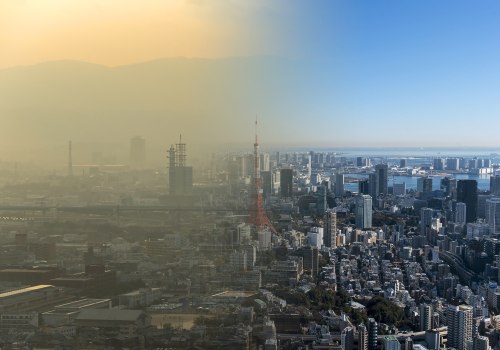The Clean Air Act , enacted in 1970 and significantly amended in 1990, represents a pivotal moment in the United States' commitment to improving air quality and protecting public health. This landmark legislation was born out of a growing awareness of the detrimental effects of air pollution on both the environment and human health. As industrialization surged in the mid-20th century, so did the levels of harmful pollutants released into the atmosphere, leading to alarming rates of respiratory diseases and environmental degradation. The Clean Air Act was designed to address these pressing issues by establishing comprehensive federal and state regulations aimed at controlling air pollution.At its core, the Clean Air Act empowers the Environmental Protection Agency (EPA) to set and enforce air quality standards that safeguard public health and the environment.
These standards are not merely guidelines; they are legally binding regulations that require states to develop implementation plans to achieve and maintain clean air. The Act has been instrumental in reducing emissions of key pollutants such as sulfur dioxide, nitrogen oxides, and particulate matter, which are known to cause serious health problems, including asthma, lung cancer, and cardiovascular diseases.The impact of the Clean Air Act extends beyond just environmental protection; it has profound implications for the economy as well. By improving air quality, the Act has led to significant reductions in healthcare costs associated with pollution-related illnesses. Healthier populations contribute to increased productivity and economic growth, demonstrating that environmental regulations can coexist with economic development.
Furthermore, cleaner air enhances the quality of life for all citizens, making communities more attractive for residents and businesses alike.As we delve deeper into the effects of the Clean Air Act on both public health and economic stability, it becomes clear that this legislation is not just a regulatory framework but a vital component of a sustainable future. The ongoing challenges posed by air pollution remind us that while progress has been made, continued vigilance and commitment to clean air initiatives are essential for safeguarding our health and environment.
Historical Context of Air Quality Regulations
The history of air quality regulations in the United States is a reflection of the growing awareness of the detrimental effects of air pollution on both public health and the environment. In the early 20th century, industrialization was in full swing, and cities across the nation were grappling with the consequences of unchecked emissions from factories and vehicles. The lack of regulation allowed industries to emit pollutants freely, leading to severe air quality issues.One of the earliest responses to air pollution came in the form of local ordinances.In 1948, the Donora Smog incident in Pennsylvania highlighted the urgent need for action. A temperature inversion trapped pollutants from local zinc smelting operations, resulting in a thick smog that caused respiratory problems for thousands and led to several deaths. This tragedy served as a wake-up call, prompting public outcry and laying the groundwork for future regulations.In 1955, Congress passed the Air Pollution Control Act , which marked the first federal legislation aimed at addressing air quality issues. However, this act primarily provided funding for research and did not impose strict regulations on emissions.
It wasn't until the 1960s that a more comprehensive approach began to take shape.The 1963 Clean Air Act was a significant milestone, as it authorized federal research into air pollution and established a framework for state-level air quality programs. This act recognized that air pollution was not just a local issue but a national concern that required coordinated efforts across states.By the late 1960s, public awareness of environmental issues surged, fueled by events such as the publication of Rachel Carson's Silent Spring and growing activism from environmental groups. This culminated in the passage of the Clean Air Act Amendments of 1970 , which set ambitious national air quality standards and established the Environmental Protection Agency (EPA) to enforce these regulations.The amendments mandated that states develop implementation plans to achieve and maintain these standards, marking a significant shift towards federal oversight in air quality management. The Clean Air Act has since undergone several amendments, notably in 1990, which expanded its scope to include hazardous air pollutants and introduced provisions for addressing acid rain and ozone depletion.This historical context underscores the evolution of air quality regulations in response to rising pollution levels and health concerns.
The establishment of a robust regulatory framework has been essential in mitigating air pollution's impact on public health and fostering a cleaner environment.
Key Provisions of the Clean Air Act
The Clean Air Act (CAA) is a comprehensive piece of legislation that has undergone several amendments since its inception in 1970. Its primary aim is to regulate air emissions from stationary and mobile sources, ensuring that air quality standards are met to protect public health and the environment. Understanding the key provisions of the Clean Air Act is essential for grasping its impact on air quality and, consequently, on public health and economic outcomes.One of the most significant aspects of the Clean Air Act is the establishment of National Ambient Air Quality Standards (NAAQS). These standards set limits on the concentration of specific pollutants in the air, including:- Particulate Matter (PM)
- Ground-level Ozone (O3)
- Nitrogen Dioxide (NO2)
- Sulfur Dioxide (SO2)
- Carbon Monoxide (CO)
- Lead (Pb)
By enforcing these limits, the CAA aims to reduce health risks associated with air pollution, such as respiratory diseases and cardiovascular problems.Another critical provision of the Clean Air Act is the regulation of emissions from industrial sources. The Act requires states to develop State Implementation Plans (SIPs) that outline how they will achieve and maintain NAAQS. These plans must include measures for controlling emissions from factories, power plants, and other industrial facilities. The CAA also mandates that new sources of pollution meet stringent emission standards, which are designed to minimize their impact on air quality.In addition to regulating stationary sources, the Clean Air Act addresses emissions from mobile sources , such as cars and trucks.
The Act sets forth requirements for fuel quality and vehicle emissions standards, which have led to significant reductions in pollutants from transportation. For instance, the introduction of cleaner fuels and more efficient engines has contributed to improved air quality in urban areas.The Clean Air Act also includes provisions for hazardous air pollutants , which are known to pose serious health risks. The EPA identifies these pollutants and establishes emission standards for industries that release them. This aspect of the CAA is crucial for protecting vulnerable populations, including children and those with pre-existing health conditions.Overall, the key provisions of the Clean Air Act play a vital role in shaping air quality management in the United States.
By setting rigorous standards for both ambient air quality and emissions from various sources, the CAA not only protects public health but also fosters economic growth by reducing healthcare costs associated with pollution-related illnesses.
Impact on Public Health
The Clean Air Act has played a pivotal role in enhancing public health across the United States by significantly reducing the levels of air pollution. This legislation has been instrumental in addressing various health issues that arise from poor air quality, particularly respiratory diseases.One of the most profound impacts of the Clean Air Act is its contribution to the decline in respiratory illnesses. According to the Environmental Protection Agency (EPA) , since the implementation of the Clean Air Act, there has been a marked decrease in hospital admissions for asthma and other respiratory conditions. For instance, studies indicate that between 1990 and 2010, asthma-related hospitalizations dropped by approximately 30% in children, a demographic particularly vulnerable to air pollution.Moreover, the Act has led to a significant reduction in emissions of harmful pollutants such as sulfur dioxide (SO2) and nitrogen oxides (NOx), which are known to exacerbate respiratory problems.The American Lung Association reports that these reductions have resulted in fewer cases of chronic bronchitis and improved lung function among children and adults alike.In addition to respiratory diseases, air pollution is linked to a range of other health issues, including cardiovascular diseases and premature deaths. A comprehensive study published in the New England Journal of Medicine found that long-term exposure to fine particulate matter (PM2.5) is associated with an increased risk of heart attacks and strokes. The Clean Air Act's stringent regulations on particulate emissions have contributed to a decrease in these health risks, saving thousands of lives each year.The economic implications of these health benefits are also noteworthy. By reducing healthcare costs associated with treating air pollution-related illnesses, the Clean Air Act has not only improved public health but also alleviated financial burdens on families and the healthcare system.
The EPA estimates that for every dollar spent on implementing the Clean Air Act, there are approximately $30 in health benefits realized.Furthermore, public awareness regarding air quality has increased due to the Clean Air Act, leading communities to advocate for cleaner air initiatives. This grassroots movement has fostered a culture of health consciousness, encouraging individuals to take proactive steps towards reducing their exposure to air pollutants.In conclusion, the Clean Air Act has had a profound impact on public health by significantly reducing respiratory diseases and other health issues linked to air pollution. The statistics and studies underscore its effectiveness in creating a healthier environment for all citizens, demonstrating that robust environmental policies can lead to substantial public health benefits.
Economic Benefits of Cleaner Air
The economic benefits of cleaner air, largely attributed to the Clean Air Act, are profound and multifaceted. By significantly reducing air pollution, the Act has not only improved public health but has also led to substantial economic gains across various sectors.One of the most immediate economic impacts of cleaner air is the cost savings in healthcare.Air pollution is a known contributor to numerous health issues, including respiratory diseases, cardiovascular problems, and even premature death. According to the Environmental Protection Agency (EPA), the Clean Air Act has resulted in billions of dollars in avoided healthcare costs. For instance, a study estimated that for every dollar spent on implementing the Clean Air Act, society has reaped approximately $30 in health benefits. This staggering return on investment underscores the financial wisdom of prioritizing clean air initiatives.Moreover, as air quality improves, populations experience fewer health-related absences from work.
This leads to an increase in productivity , which is essential for economic growth. Healthier individuals are more likely to be present and engaged in their jobs, contributing positively to their workplaces. A healthier workforce can also lead to lower insurance premiums for employers, further enhancing their bottom line.In addition to direct healthcare savings and productivity gains, cleaner air can stimulate overall economic growth. Regions with better air quality often attract new businesses and industries that prioritize sustainability and employee well-being.
This influx can create jobs and foster innovation in green technologies and practices. Furthermore, improved air quality can enhance property values as communities become more desirable places to live and work.Tourism is another sector that benefits from cleaner air. Areas known for their pristine environments and good air quality tend to attract more visitors. Tourists are increasingly aware of environmental issues and often choose destinations based on their commitment to sustainability.
This trend not only boosts local economies but also encourages further investment in clean air initiatives.In conclusion, the economic benefits stemming from the Clean Air Act are significant and far-reaching. From reduced healthcare costs and increased productivity to enhanced property values and tourism revenue, cleaner air contributes positively to the economy. As we continue to prioritize clean air policies, we can expect these benefits to grow, reinforcing the importance of maintaining a healthy environment for future generations.
Challenges and Criticisms of the Clean Air Act
While the Clean Air Act has made significant strides in improving air quality and public health, it has not been without its challenges and criticisms. Understanding these obstacles is essential for a comprehensive evaluation of the Act's effectiveness and its future.One of the primary criticisms of the Clean Air Act is its perceived regulatory burden on industries.Many businesses argue that compliance with the stringent regulations imposed by the Act can be costly and time-consuming. This is particularly true for small and medium-sized enterprises that may lack the resources to implement necessary changes. The costs associated with upgrading equipment, conducting emissions testing, and maintaining compliance can be substantial, leading some to argue that these regulations stifle economic growth.Moreover, there are concerns regarding the flexibility of the regulations. Critics argue that the one-size-fits-all approach does not account for regional differences in air quality or economic conditions.
For instance, areas with historically poor air quality may require more stringent measures than those with better air quality. This lack of tailored solutions can lead to frustration among local governments and businesses alike.Another significant challenge lies in the implementation of the Clean Air Act. While the federal government sets national standards, it is often up to state and local agencies to enforce these regulations. This decentralized approach can result in inconsistencies in enforcement and compliance across different regions.
Some states may prioritize economic development over environmental protection, leading to lax enforcement of air quality standards.The Act has also faced opposition from various industries, particularly those heavily reliant on fossil fuels. The energy sector, manufacturing, and transportation industries have voiced concerns about how stringent air quality regulations could impact their operations. This opposition often manifests in lobbying efforts aimed at weakening regulations or delaying their implementation.Additionally, there are ongoing debates about the scientific basis for some of the standards set by the Clean Air Act. Critics argue that certain regulations may be based on outdated or incomplete scientific data, leading to calls for more rigorous research before implementing new standards.In conclusion, while the Clean Air Act has undoubtedly contributed to improved air quality and public health, it faces significant challenges and criticisms that must be addressed.
Balancing economic interests with environmental protection remains a complex issue that requires ongoing dialogue among stakeholders to ensure that both public health and economic vitality are prioritized.
Case Studies: Success Stories from the Clean Air Act
The Clean Air Act has served as a powerful catalyst for change in air quality across the United States, with numerous cities showcasing remarkable success stories. These case studies not only highlight the effectiveness of the Act but also demonstrate the profound impact on public health and local economies.Los Angeles, California
, often cited as a prime example, faced severe smog issues in the mid-20th century. The implementation of the Clean Air Act led to stringent regulations on vehicle emissions and industrial discharges. Over the decades, Los Angeles has seen a significant reduction in ozone levels, with air quality improving by over 50% since the 1970s.
This transformation has resulted in fewer respiratory illnesses and hospital visits, showcasing how effective policy can lead to healthier communities.
New York City
is another notable success story. In the 1970s, the city struggled with high levels of sulfur dioxide and particulate matter due to heavy industrial activity and vehicle emissions. The Clean Air Act prompted initiatives such as the introduction of cleaner fuels and stricter emission standards for vehicles. As a result, New York City has experienced a dramatic decline in air pollution levels, contributing to a healthier population and enhancing the quality of life for its residents.
Denver, Colorado
, has also made significant strides under the Clean Air Act.
The city implemented a comprehensive air quality management plan that included promoting public transportation and reducing emissions from local industries. These efforts have led to improved air quality, with reductions in nitrogen oxides and particulate matter. The positive outcomes have not only benefited public health but have also attracted businesses and tourism, further boosting the local economy.Moreover, Seattle, Washington , has embraced clean air initiatives through community engagement and innovative policies. The city has focused on reducing vehicle emissions by promoting electric vehicles and enhancing public transit options.
As a result, Seattle has seen improvements in air quality metrics, which correlate with lower rates of asthma and other respiratory conditions among its residents.These case studies illustrate that the Clean Air Act is more than just legislation; it is a framework for fostering healthier environments and communities. By investing in clean air initiatives, cities not only improve public health outcomes but also stimulate economic growth through enhanced productivity and reduced healthcare costs. The success stories from Los Angeles, New York City, Denver, and Seattle serve as powerful reminders of what can be achieved when communities commit to clean air policies.
The Future of Air Quality Legislation in America
As we look toward the future of air quality legislation in America, it is essential to recognize the evolving landscape of environmental policy. The Clean Air Act has set a strong foundation, but emerging trends and challenges will shape the next phase of air quality initiatives.One significant trend is the increasing focus on climate change and its intersection with air quality.As scientific evidence mounts regarding the impacts of greenhouse gases on public health and the environment, future legislation may integrate stricter regulations on emissions from various sectors, including transportation and industry. This could lead to a more comprehensive approach that not only targets traditional pollutants but also addresses carbon emissions and their role in climate change.Moreover, advancements in technology are paving the way for innovative solutions to air quality issues. The rise of smart cities and the Internet of Things (IoT) allows for real-time monitoring of air quality, enabling policymakers to make data-driven decisions. Future legislation may incorporate these technologies to enhance compliance and enforcement mechanisms, ensuring that air quality standards are met more effectively.Another critical aspect is the growing public awareness and advocacy surrounding environmental justice.
Communities disproportionately affected by air pollution are increasingly vocal about their needs. Future air quality legislation may prioritize these communities, ensuring that regulations not only improve overall air quality but also address historical inequities. This could involve targeted funding for pollution reduction initiatives in vulnerable areas.Additionally, as states take more initiative in environmental policy, we may see a patchwork of regulations that vary significantly across the country. This could lead to a competitive landscape where states strive to implement more stringent air quality measures to attract businesses and residents who prioritize sustainability.
However, this decentralization may also pose challenges in maintaining consistent national standards.In conclusion, the future of air quality legislation in America is poised for transformation. By embracing technological advancements, addressing climate change, prioritizing environmental justice, and navigating state-level dynamics, policymakers can create a robust framework that not only improves air quality but also enhances public health and economic resilience.
Conclusion: The Lasting Impact of the Clean Air Act on Society
In reflecting on the profound effects of the Clean Air Act, it becomes evident that this landmark legislation has not only transformed air quality across the United States but has also significantly influenced public health and economic stability. The Act has served as a vital framework for regulating air pollutants, leading to cleaner air and healthier communities.One of the most compelling outcomes of the Clean Air Act is its direct correlation with improved public health. By reducing harmful emissions from industrial sources and vehicles, the Act has played a crucial role in decreasing the incidence of respiratory diseases, cardiovascular conditions, and other health issues linked to air pollution.The reduction in healthcare costs associated with these illnesses is a testament to the Act's effectiveness. According to various studies, every dollar invested in air quality improvements yields substantial returns in health benefits, showcasing a clear return on investment .Moreover, the economic implications of the Clean Air Act extend beyond healthcare savings. The legislation has fostered innovation within industries as companies adapt to meet stricter environmental standards. This shift has not only created jobs in clean technology sectors but has also stimulated economic growth by encouraging investment in sustainable practices.
As businesses strive to comply with regulations, they often discover new efficiencies and opportunities that can lead to increased productivity.Furthermore, the Clean Air Act has had a positive impact on tourism and local economies. Regions known for their natural beauty and clean air are more attractive to visitors. Improved air quality enhances outdoor recreational activities, which can be a significant draw for tourists. This influx of visitors can provide a much-needed boost to local businesses, further reinforcing the economic benefits of clean air initiatives.As we look to the future, it is crucial to recognize that while significant progress has been made, challenges remain. As businesses strive to comply with regulations, they often discover new efficiencies and opportunities that can lead to increased productivity.Furthermore, the Clean Air Act has had a positive impact on tourism and local economies. Regions known for their natural beauty and clean air are more attractive to visitors. Improved air quality enhances outdoor recreational activities, which can be a significant draw for tourists. This influx of visitors can provide a much-needed boost to local businesses, further reinforcing the economic benefits of clean air initiatives.As we look to the future, it is crucial to recognize that while significant progress has been made, challenges remain.
Ongoing efforts are necessary to address emerging pollutants and adapt to changing environmental conditions. The lessons learned from the Clean Air Act should inspire continued commitment to clean air initiatives at all levels of government and society.In conclusion, the Clean Air Act stands as a powerful example of how effective policy can lead to substantial improvements in public health and economic vitality. Its legacy is one of hope and progress, reminding us that through collective action and dedication to clean air initiatives, we can create a healthier environment for current and future generations.










